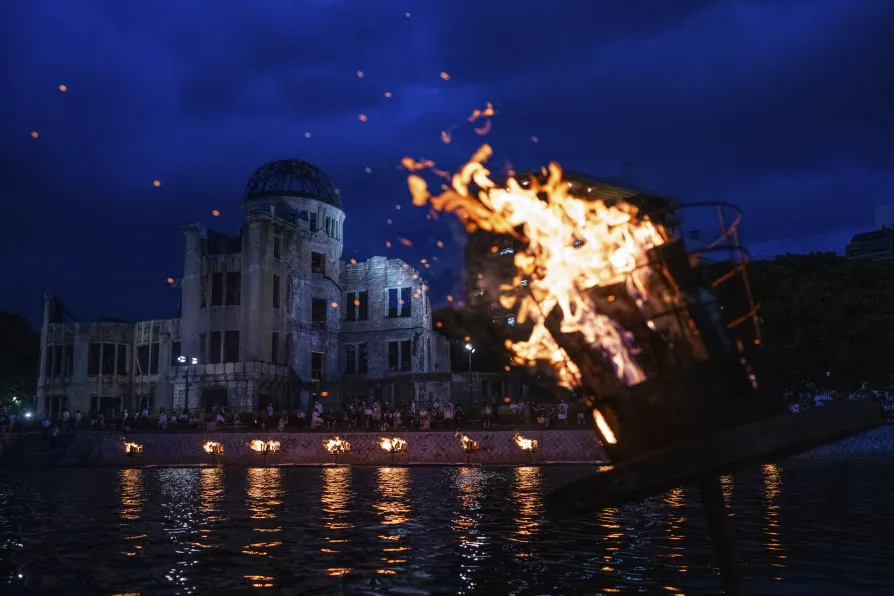
 Bonfires are lit along the Motoyasu River in front of the Atomic Bomb Dome during a remembrance ceremony in Hiroshima, August 5, 2025 on the eve of the 80th anniversary of the atomic bombing
Bonfires are lit along the Motoyasu River in front of the Atomic Bomb Dome during a remembrance ceremony in Hiroshima, August 5, 2025 on the eve of the 80th anniversary of the atomic bombing
“NEVER again.” The vow made when commemorating history’s worst crimes.
Given the unending horror in Gaza, it has most often been quoted this year to highlight the hypocrisy of a British state which holds solemn ceremonies on anniversaries linked to previous genocides but is actively facilitating unspeakable crimes against the Palestinians.
The 80th anniversaries of the atomic bombings of Hiroshima and Nagasaki this week see more “never again” promises, again often hypocritical.
This newspaper’s predecessor the Daily Worker, reporting on the Hiroshima bombing in 1945, was understandably ignorant of how uncalled for it was in military terms: we know now that Japan was already trying to surrender; that, as the US commander Dwight Eisenhower said, “it wasn’t necessary to hit them with that awful thing;” that the United States dropped the bombs not to win the war but to intimidate its soon-to-be cold war rival the Soviet Union.
But the Worker did immediately grasp the terrifying power of the new weapons. “A new war waged by great states possessing this terrible power of destruction would indeed mark the end of all human civilisation.”
We know that far better today than in 1945: the long-term radiation dangers from nuclear explosions, causing cancers and birth defects, would only become clear in the months and years afterwards, and in governments’ studies of exposure to nuclear fallout after atom bomb tests (conducted on unwitting guinea pigs ranging from their own soldiers to local populations). The global impact of a post-conflict “nuclear winter” could not then be imagined.
So there is no excuse for complacency, as governments start to question the long taboo and toy with the concept of “tactical nuclear weapons,” used to gain battlefield advantage.
The Worker was cautiously optimistic in 1945: the people’s war against fascism was nearly won. Hope was strong that an era of peace and co-operation was on the horizon, regulated by international law and presided over by the United Nations.
Those hopes weren’t realised, but they didn’t count for nothing either. The popular expectation of peace deterred US and British leaders from launching war against the Soviet Union — for which they had drawn up detailed plans — on the defeat of Nazi Germany; the popular horror of nuclear war drove Britain’s Clement Attlee to persuade the US not to drop atom bombs on Korea.
Today we see a collapse of respect for the UN and international law. The Gaza genocide is one example: the US has committed appalling crimes since 1945, but open endorsement of ethnic cleansing would have been unthinkable till recently.
Lowering the threshold for nuclear war is another. We see it in the decision to spend billions expanding our nuclear arsenal and in the purchase of US nuclear-capable bombers designed for offensive operations.
Any violation of the taboo that emerged from the radioactive dust of Hiroshima and Nagasaki would spell disaster for us all.
It was peoples, not governments, that built that taboo out of their horror at what had been unleashed on those cities, maintaining it through a mass disarmament movement that held marches to Aldermaston and camped on Greenham Common.
It falls to peoples, not governments, to prevent nuclear war today: rebuilding a mass movement for disarmament, re-educating communities on what nuclear war would really mean and how reckless our government is in flirting with it.
The Campaign for Nuclear Disarmament, a leading player in the wider peace movement including against the war on Palestine, is again rallying outside military bases and opposing the renewed deployment of US nuclear weapons on British soil.
Through organising public meetings, workshops or classes utilising its educational resources on nuclear conflict, and through film screenings and discussions, we can all do our part to help. Only a people alerted to the scale of the danger will hold back our bellicose and blinkered political elite.

As we mark the anniversaries of the Hiroshima and Nagasaki bombings, JOHN WIGHT reflects on the enormity of the US decision to drop the atom bombs

JEREMY CORBYN reports from Hiroshima where he represented CND at the 80th anniversary of the bombing of the city by the US











